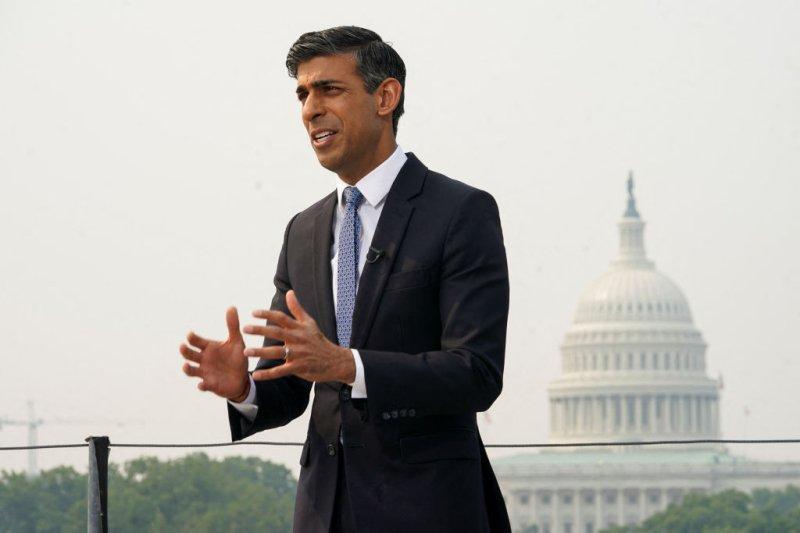
The U.K. Must Do More to Stop the Iranian Terrorists
As the U.K. Prime Minister Rishi Sunak makes his first visit to the White House on June 8 to renew the “special relationship,” it is crucial that President Biden urges him to take decisive action against the Islamic Revolutionary Guard Corps (IRGC). The time to proscribe the IRGC as a terrorist organization is now.
As an advocate for human rights and freedom of speech, I have first-hand experience with the IRGC’s reign of terror. Last month, during my visit to London, I was placed under 24-hour armed guard by the Metropolitan Police due to credible threats on my life. I did not learn the names of the quiet, serious detectives who maintained this protective cordon around me, but I do know the name of the evil force from whom they were assigned to keep me safe: the IRGC.
They have wanted to kill me for some time now. They have tried several times. The last thing I expected was to have the Metropolitan Police turning up at my hotel after a television interview with Piers Morgan. The police told me that they had intelligence suggesting that there was a serious threat to my life. They did not leave my side from that point onwards.
The fear and uncertainty that come with being a target of the IRGC are indescribable. Their attempts to silence me and others who dare to speak out against the Iranian regime have been relentless. From assassination plots to hired killers showing up at my doorstep, I have faced the horrors unleashed by this terrorist organization firsthand.
Last July, a hired killer came to my front door in Brooklyn, New York, armed with an AK-47. He was part of an Eastern European criminal syndicate likely recruited by the IRGC. One year earlier, the FBI foiled a plot to kidnap me organized by Iran’s Intelligence Ministry.
But my story is not unique. The IRGC’s reach extends far beyond my personal experiences. MI5, the UK’s domestic security agency, recently revealed that British security forces have responded to at least 15 credible threats to kill or kidnap individuals targeted by the Iranian regime since the start of 2022. The magnitude of this threat is staggering, and it demands immediate action.
The situation in the U.K. had already become so dire that Iran International—a Persian language media outlet which has invited the chagrin of the regime for daring to beam reliable news into Iran via satellite—was forced to flee the U.K. in February 2023. The channel’s relocation to Washington was deemed necessary despite the stationing of armed anti-terrorist police outside Iran International’s Chiswick office and the provision of round the clock protection to several of its journalists.
How is it possible that the U.K.—with one of the most sophisticated security apparatuses in the world—cannot even protect people on its own soil?
It is not enough to announce piecemeal sanctions on entities and individuals who have no assets abroad and are unlikely to travel there in the future. The U.K. Foreign Secretary James Cleverly insists that the British government has sanctioned the IRGC in its entirety already. But those very same sanctions are scheduled to be lifted in October under the JCPOA and the power of proscription as a terrorist organization is greater than the weapons of mass destruction-related authorities under which the IRGC is already sanctioned.
To make matters worse, the U.K. has not even punished the Islamic Republic after its own citizens were maimed and killed. For instance, in July 2021 after the IRGC’s Aerospace Force attacked the Mercer Street commercial vessel killing two European nationals, including one British citizen, not even one sanction was levied on the Islamic Republic. Fast forward to 2022 and after a brutal stabbing attack on author Salman Rushdie, who also holds U.K. citizenship, in New York by a reported IRGC sympathizer, London merely issued a statement but did not publicly act. Soon after, then candidate for Prime Minister Rishi Sunak voiced his support for the IRGC to be designated as a terrorist group, saying the attack should serve as a “wake up call for the West.”
The challenge facing Europe is not only about protecting its own citizens but also about standing up for the values of freedom, democracy, and human rights. By designating the IRGC as a terrorist organization, the prime minister can send a powerful message that he will not tolerate state-sponsored terrorism and will defend those who fight for justice and liberty.
The painful reality remains that European governments remain paralyzed by inaction. London is taking a leading role in fortifying Ukraine against nuclear-armed Russia. But when it comes to merely sanctioning the IRGC, which does not yet have nuclear weapons, it hesitates.
U.S. lawmakers have grown so concerned with this dynamic that they have written letters to their counterparts on a bipartisan basis strongly encouraging them to add the IRGC to their terrorism lists just as Washington has already done. President Biden should follow suit. To date, the Biden administration has not made a clear public statement specifically calling on its allies to sanction the IRGC as a terrorist organization. It has only made vague remarks that it is working with its allies and partners to hold the Iranian regime accountable and that it encourages them to consider any applicable sanctions authorities, including an IRGC designation.
As a survivor of the IRGC’s campaign of terror, I implore the U.K. government to take concrete action and prioritize the safety and security of its citizens by proscribing the IRGC as a terrorist organization. I also call on President Biden to use this opportunity to remind the U.K. prime minister that if the “special relationship” between our two countries is to mean anything, it is time to call the IRGC what it is: a terrorist organization.
Lives depend on it.
Source » time





